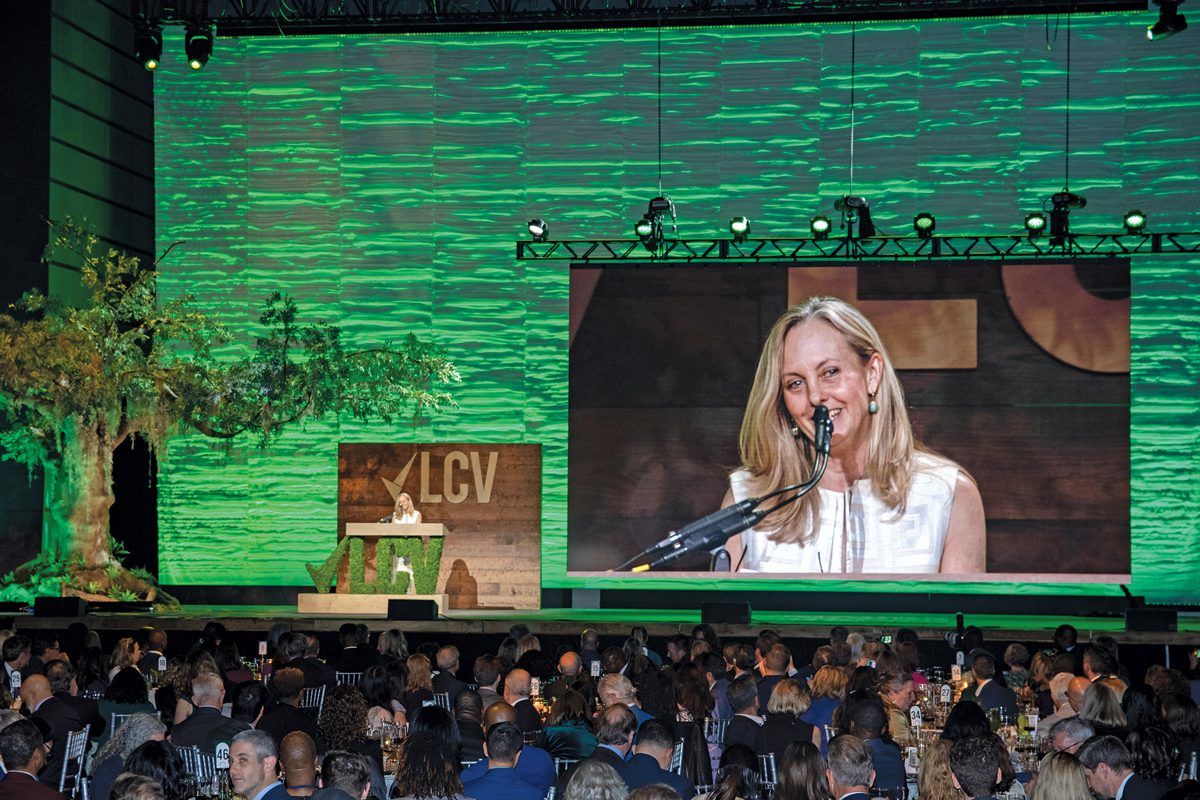Wozniak is executive director of the Michigan League of Conservation Voters. It was founded in 1999, she says, “to address some of our state’s most egregious problems regarding the air we breathe, the water we drink, and protecting public health and the natural environment.”
A volunteer group had been putting out environmental scorecards during elections, but the league’s founders “decided that we needed to have a stronger voice,” Wozniak says. “Making sure the people elected to office in the state did what they said they were going to do on these issues, and that they were held accountable.”
They started with fewer than ten members, including Wozniak and former Ann Arbor state senator Lana Pollack. Now the Ann Arbor–based nonprofit counts more than 15,000 contributing members and has thirty-five employees. MLCV has “played pivotal roles in key things like the passage of climate and clean energy legislation last year in Lansing,” Wozniak says—including Michigan’s Clean Energy & Jobs Act, which will require the state’s energy to come from 50 percent renewable sources by 2030 and 60 percent by 2035.
Since its founding, MLCV has focused on door-to-door canvassing to promote environmental causes and support political candidates whose goals align with MLCV’s priorities, which include clean air and climate action, safe and affordable drinking water, environmental justice, and voting access.

Wozniak speaks at the League of Conservation Voters’ Capital Dinner in March. The national group honored the Michigan chapter for “its leadership and relentless work to combat the climate crisis in Michigan and playing a key role to pass Michigan’s historic legislation to commit to 100 percent clean energy.” | Photo courtesy of MLCV
The group “endorsed and supported (financially and via voter engagement) the 2018 Voters Not Politicians anti-gerrymandering ballot initiative, which resulted in the establishment of the Michigan Independent Citizens Redistricting Commission,” Wozniak emails. “We have also played a key role in the Commission’s work in creating the new districts, mobilizing citizens to make their voices heard and advocate for their communities.”
In 2020, the last presidential election year, MLCV’s two political action committees backed seventy-one candidates, sixty-three of whom were elected—an 89 percent win rate.
“The thing that we have added in the last few years has been a deep dedication to protecting our democracy and voting rights,” Wozniak says. “We had some pretty big scares in this country around people trying to take away voting rights and fight the outcomes of elections. We have been super-proud to play partnership roles in the passage of two important ballot initiatives that have expanded our voting rights in the state,” including early in-person voting and easier absentee voting.
In March of this year, the national LCV made headlines by committing $120 million from its super PAC to support President Biden’s reelection—the most it has ever invested in an election cycle. In July, it joined the Sierra Club and other conservation organizations in throwing its support to Kamala Harris.
At the state level, the Michigan LCV has endorsed forty-four candidates for the state house, all Democrats, as well as two supreme court justices. Development director Lee Berry emails that by mid-September, it had raised nearly $600,000 for its Michigan LCV PAC, which provides direct support to candidates, and $3.4 million for its super PAC, Conservation Voters of Michigan PAC, which works independently on their behalf.
According to public records, the MLCV’s income increased from $1.2 million in 2019 to $3.1 million in 2022. Its 2023 Impact Report shows another big jump, to $4.7 million.
Berry qualifies that, pointing out that last year’s total “includes several large multiyear grants” that will stretch over as many as three years. But the staff—some working in an office at Beakes and N. Division, others remotely—has been growing. As the Observer went to press in September, they were advertising for regional and campus organizers and two positions dedicated to elections protection.
Earlier this year, communications director Nick Dodge emails, MLCV sent people door-to-door “to educate Michiganders about President Biden’s Inflation Reduction Act, encouraging them to get home energy assessments and take advantage of federal funds to upgrade their homes to be more energy efficient and install solar.” Now they’re out campaigning for MLCV’s legislative and supreme court candidates.
“I like to say that we are the one-stop shop for environmental policy, political organizing, elections, and voter education,” says Wozniak. “We got some big wins last year but have more work to do.”